#Patricio Guzmán
Explore tagged Tumblr posts
Text
September 11, 1973: On the 50th Anniversary of the Coup in Chile
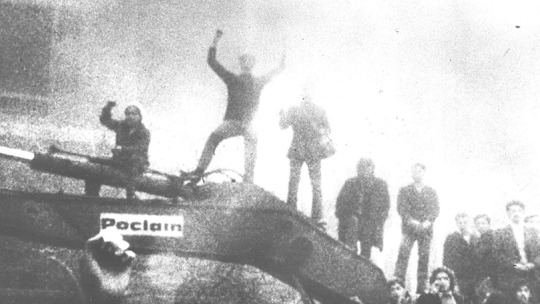
Today marks the 50th anniversary of the coup d’état in Chile, when a fascist junta led by dictator Augusto Pinochet overthrew the democratically elected socialist government of Salvador Allende. For those of us who are on the left, the story should be familiar by now: Allende had charted a ‘Chilean way to socialism' ("La vía chilena al socialismo") quite distinct from the Soviet Union and communist China, a peaceful path to socialism that was fundamentally anti-authoritarian, combining worker power with respect for civil liberties, freedom of the press, and a principled commitment to democratic process. For leftists who had become disillusioned with the Soviet drift into authoritarianism, Chile was a bright spot on an otherwise gloomy Cold War map.
What happened in Chile was one of the darkest chapters in the history of US interventionism. In August 1970, Henry Kissinger, who was then Nixon’s national security adviser, commissioned a study on the consequences of a possible Allende victory in the upcoming Chilean presidential election. Kissinger, Nixon, and the CIA—all under the spell of Cold War derangement syndrome—determined the US should pursue a policy of blocking the ascent of Allende, lest a socialist Chile generate a “domino effect” in the region.
When Allende won the presidency, the US did everything in their power to destroy his government: they meddled in Chilean elections, leveraged their control of the international financial system to destroy the economy of Chile (which they also did through an economic boycott), and sowed social chaos through sponsoring terrorism and a shutdown of the transportation sector, bringing the country to the brink of civil war. Particularly infuriating to the Americans was Allende’s nationalization of the copper mining industry, which was around 70% of Chile’s economy at the time and was controlled by US mining companies like Anaconda, Kennecott and the Cerro Corporation. When the CIA’s campaign of sabotage failed to destroy the socialist experiment in Chile, they resorted to assisting general Augusto Pinochet's plot to overthrow the democratically elected government. What followed was a gruesome campaign of repression against workers, leftists, poets, activists, students, and ordinary Chileans—stadiums were turned into concentration camps where supporters of Allende’s Popular Unity government were tortured and murdered. During Pinochet’s 17-year reign of terror, 3,200 people were executed and 40,000 people were detained, tortured, or disappeared, 1,469 of whom remain unaccounted for. Chile was then used as a laboratory for neoliberal economic policies, where the Chicago boys and their ilk tested out their terrible ideas on a population forced to live under a military dictatorship.
It shatters my heart, thinking about this history. I feel a personal attachment to Chile, not only because my partner is Chilean (his father left during the dictatorship), but because I’ve always considered Chile to be a world capital of poetry and anti-authoritarian leftism. The filmmaker Alejandro Jodorowsky asks, “In how many countries does a real poetic atmosphere exist? Without a doubt, ancient China was a land of poetry. But I think, in the 1950s in Chile, we lived poetically like in no other country in the world.” (Poetry left China long ago — oh how I wish I’d been around to witness the poetic flowering of the Tang era!) Chile has one of the greatest literary traditions of the twentieth century, producing such giants as Bolaño and Neruda, and more recently, Cecilia Vicuña and Raúl Zurita, among others.

To commemorate the 50th anniversary of the coup, the Harvard Film Archive has been screening Patricio Guzmán’s magisterial trilogy, The Battle of Chile, along with a program of Chilean cinema. I watched part I and II the last two nights and will watch part III tonight. It’s no secret that I am a huge fan of Guzmán’s work, and even quoted his beautiful film Nostalgia for the Light in the conclusion of my book Carceral Capitalism, when I wrote about the Chilean political prisoners who studied astronomy while incarcerated in the Atacama Desert. Bless Patricio Guzmán. This man has devoted his life and filmmaking career to the excavation of the Chilean soul.
Parts I and II utterly destroyed me. I left the theater last night shaken to my core, my face covered in tears.


The films are all the more remarkable when you consider it was made by a scrappy team of six people using film stock provided by the great documentarian Chris Marker. After the coup, four of the filmmakers were arrested. The footage was smuggled out of Chile and the exiled filmmakers completed the films in Cuba. Sadly, in 1974, the Pinochet regime disappeared cameraman Jorge Müller Silva, who is assumed dead.
It’s one thing to know the macro-story of what happened in Chile and quite another to see the view from the ground: the footage of the upswell of support for radical transformation, the marches, the street battles, the internal debates on the left about how to stop the fascist creep, the descent into chaos, the face of the military officer as he aims his pistol at the Argentine cameraman Leonard Hendrickson during the failed putsch of June 1973 (an ominous prelude to the September coup), the audio recordings of Allende on the morning of September 11, the bombing of Palacio de La Moneda—the military is closing in. Allende is dead. The crumbling edifice of the presidential palace becomes the rubble of revolutionary dreams—the bombs, a dirge for what was never even given a chance to live.
#Patricio Guzmán#film#Chile#history#salvador allende#socialism#marxism#coup#coup d'etat#The Battle of Chile#revolution#cinema#fascism#communism#geopolitics#political economy#Cold War#chris marker#memory#neoliberalism#capitalism#politics
102 notes
·
View notes
Text

Happy 83rd, Patricio Guzmán.
11 notes
·
View notes
Text

Nostalgia for the Light (Patricio Guzmán, 2010)
4 notes
·
View notes
Text
3 movies i want to watch asap
Mi país imaginario, Patricio Guzmán
Neptune frost, Anisia Uzeyman, Saul Williams
Meeting the man : James Baldwin in Paris (short)
2 notes
·
View notes
Text
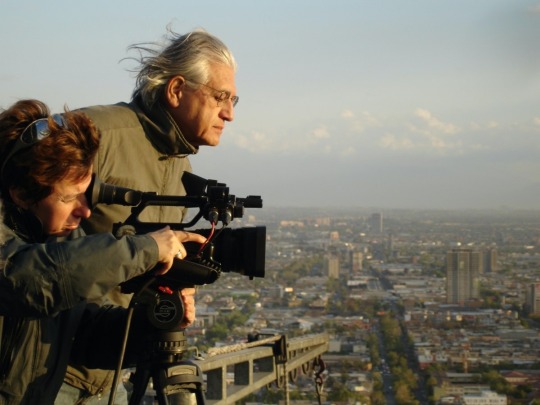
Still from Nostalgia for the Light, dir. Patricio Guzmán, 2010 (all images courtesy Cinema Tropical)
4 notes
·
View notes
Photo



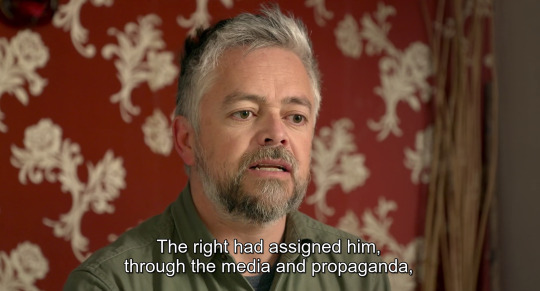
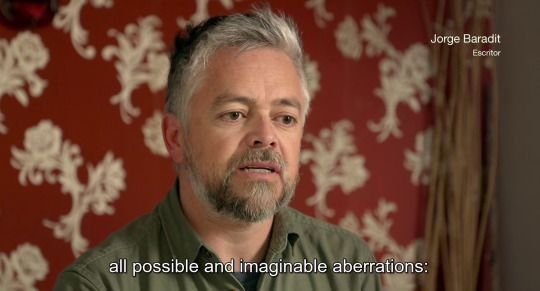


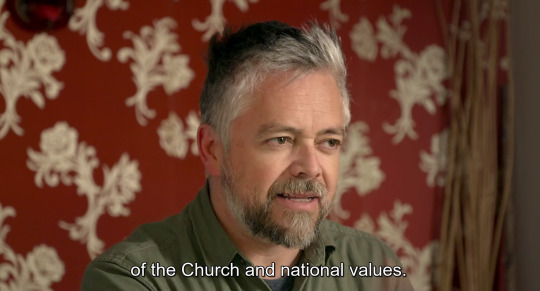
La cordillera de los sueños (2019), dir. Patricio Guzmán
#la cordillera de los sueños#the cordillera of dreams#patricio guzmán#chile#watching this in a fucking big screen was an experience#*#film stills#chilean cinema
4 notes
·
View notes
Text
チューリヒへの旅より
チューリヒへの旅より:5月8日からごく短期間チューリヒを訪れた際に接したトーンハレ管弦楽団の演奏会、《フィデリオ》の公演、リートベルク美術館での展覧会や映画の上映などについて記しています。
前アルプスを望むチューリヒ湖の風景 広島では初夏のような蒸し暑い日が続いています。みなさまお元気でお過ごしでしょうか。去る5月8日から11日にかけて、ごく短期間ではありますが、スイスのチューリヒへ出かけました。クリストフ・フォン・ドホナーニが指揮するチューリヒのトーンハレ管弦楽団の演奏会を聴くのが主たる目的でしたが、それ以外にもオペラを観たり、美術館を訪れたり、旧知の友人と、前アルプスを望むチューリヒ湖畔でゆっくり語らったりすることができました。音楽に身を浸す喜びだけでなく、今後の研究へ向けた刺激も得ることもできました。この時季の緑はとても鮮やかで、眩いばかり。チューリヒ湖畔から前アルプスを望むと、冠雪の残る山並みと多彩な緑のコントラストも楽しめました。 5月9日と10日の2日間、トーンハレでこの響きの豊かな「楽堂」の名を冠したオーケストラの演奏会を聴きました。曲目は、ルドルフ・ブッフビ…
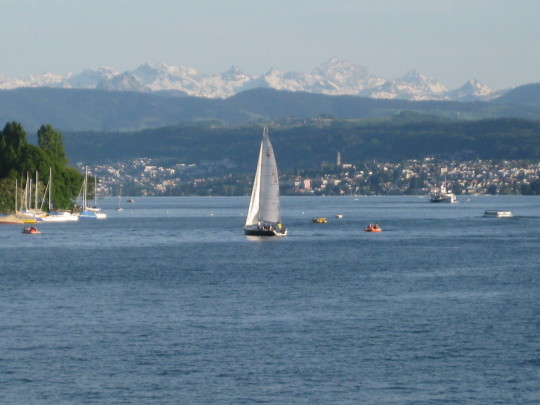
View On WordPress
#Andreas Homoki#Anja Kampe#Anton Bruckner#Christoph von Dohnányi#Fidelio#Ludwig van Beethoven#Markus Poschner#Museum Rietberg#Nostalgia de la lùz#Patricio Guzmán#Rudolf Buchbinder#Tonhalle Orchester Zürich#Wolfgang Amadeus Mozart
0 notes
Text

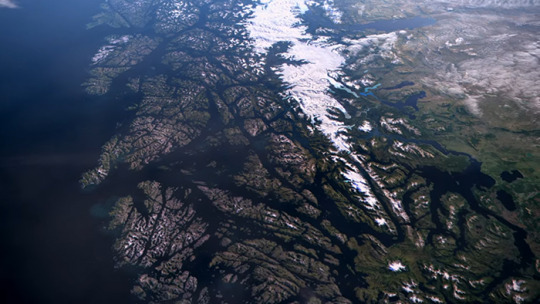


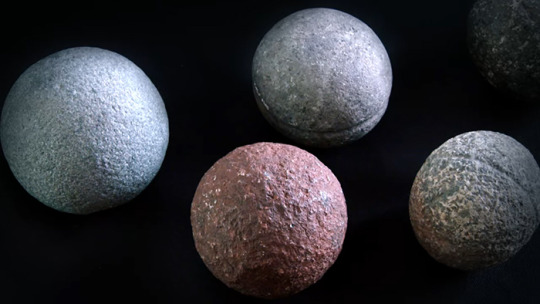




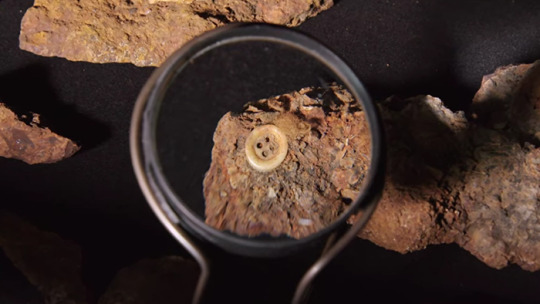
El botón de nácar Patricio Guzmán Chile/France/Spain/Switzerland, 2015 ★★★ Netflix* just made three Patricio Guzmán documentaries available.
Sometimes Netflix is good.
*netflix latam, that is
0 notes
Text
MON PAYS IMAGINAIRE
J'anime des séances de cinéma consacrées à Mon pays imaginaire de Patricio Guzmán, avec l'ADRC. Pour en savoir plus sur les modalités d'interventions : cliquer ici

0 notes
Text

From ‘The Battle of Chile’ directed by Patricio Guzmán
original/sourced version: https://www.tumblr.com/fuckyeahmarxismleninism/188658137823/from-the-battle-of-chile-directed-by-patricio
7 notes
·
View notes
Text




No one asked for this but here's McGoohan in space, before the aliens sent him back to his wife because he was such a nuisance without her.
References:
The Little Prince (Antoine de Saint-Exupéry)
The Tale of the Princess Kaguya (Isao Takahata, 2013)
Nostalgia for the Light (Patricio Guzmán, 2010)
Solaris mon amour (Kuba Mikurda, 2023)
#patrick mcgoohan#my lousy photoshopping#mcgoohan arthouse#the prisoner redux#ice station zebra redux#no context mcgoohan#mcgoohan for kids
20 notes
·
View notes
Text

La Cordillera de los Sueños (2019), Patricio Guzmán
3 notes
·
View notes
Text

Happy 82nd, Patricio Guzmán.
With cinematographer Jorge Müller shooting The Battle of Chile (1975).
18 notes
·
View notes
Text
RWBY Spanish dub

Team RWBY
Ruby Rose: Valentina Souza
Weiss Schnee: Romina Marroquín Payró
Blake Belladonna: Alondra Hidalgo
Yang Xiao Long: Mireya Mendoza
Team JNPR
Jaune Arc: Óscar Flores
Nora Valkyrie: Analiz Sánchez, Regina Carrillo (young)
Pyrrha Nikos: Berenice Vega
Lie Ren: Alan Fernando Velázquez, Zoe Mora (young)
Team STRQ
Summer Rose: Ale Pilar
Taiyang Xiao Long: Arturo Mercado Jr.
Raven Branwen: Fernanda Robles
Qrow Branwen: Germán Fabregat
Beacon Academy
Professor Ozpin: Mario Arvizu
Glynda Goodwitch: Maru Guzmán
Peter Port: Francisco Colmenero
Bartholomew Oobleck: Beto Castillo
Salem’s Inner Circle
Salem: Irasema Terrazas
Cinder Fall: Dulce Guerrero
Roman Torchwick: Sergio Gutiérrez Coto
Emerald Sustrai: Alicia Vélez
Mercury Black: Erick Salinas
Neopolitan: Agustina Cirulnik
Dr. Arthur Watts: Armando Réndiz
Tyrian Callows: Miguel Ángel Ruiz
Hazel Rainart: Octavio Rojas
The Hound: Mario Castañeda
Leonardo Lionheart: Humberto Solórzano
Vernal: Rebeca Patiño
Tock: Simone Brook
Atlas Military
James Ironwood: Dafnis Fernández
Winter Schnee: Xóchitl Ugarte
Penny Polendina: Cristina Hernández
Caroline Cordovin: Magda Giner
Ruby’s Group
Oscar Pine: Luis Leonardo Suárez
Maria Calavera: Ángela Villanueva
Dr. Pietro Polendina: Gerardo Reyero
Team SSSNN
Sun Wukong: Alexis Ortega
Scarlet David: Alberto Bernal
Sage Ayana: Abraham Vega
Neptune Vasilias: Enzo Fortuny
Nolan Porfirio: Pepe Vilchis
Team CFVY
Coco Adel: Liliana Barba
Fox Alistair: Geezuz González
Velvet Scarlatina: Carla Castañeda
Yatsuhashi Daichi: Óscar Garibay
Ace-Ops
Clover Ebi: Raúl Anaya
Vine Zeki: Eduardo Giaccardi
Elm Ederne: Gabriela Guzmán
Harriet Bree: Karla Falcón
Marrow Amin: Ricardo Tejedo
Happy Huntresses
Robyn Hill: Erica Edwards
May Marigold: Ruth Toscano
Joanna Greenleaf: Yvette García
Fiona Thyme: Lupita Leal
The White Fang
Ghira Belladonna: Emilio Guerrero
Kali Belladonna: Rebeca Manríquez
Adam Taurus: Alejandro Orozco
Corsac Albain: Emmanuel Bernal
Fennec Albain: Eduardo Garza
Ilia Amitola: Monserrat Mendoza
Schnee Manor
Jacques Schnee: Arturo Mercado
Whitley Schnee: Moisés Iván Mora
Willow Schnee: Yolanda Vidal
Klein Sieben: Jesse Conde
Ancient Times
Ozma: Roberto Salguero/Ricardo Bautista
God of Light: José Luis Orozco
God of Darkness: Salvador Reyes
Jinn: Danann Huicochea
Ambrosius: Rubén Cerda
Xiong Family
Hei “Junior” Xiong: Eduardo Fonseca
Lil’ Miss Malachite: Leyla Rangel
Miltia and Melanie Malachite: Lourdes Arruti
Team CRDL
Cardin Winchester: Raúl Anaya
Russel Thrush: Yamil Atala
Team FNKI
Flynt Coal: José Ángel Torres
Neon Katt: Meli G
Arc Family
Saphron Cotta-Arc: Erika Ugalde
Terra Cotta-Arc: Carla Medina
The Ever After
Little/Somewhat: Angélica Villa
Curious Cat: Ángel Balam
Blacksmith: Carmen Sarahí
Jabberwalker: Víctor Hugo Aguilar
Jinxy: Jaime López
Red Prince: Pascual Meza
Herbalist: César Bono
Alyx: Julia Bilous
RWBY: Grimm Eclipse
Dr. Merlot: Sebastián Llapur
RWBY: Arrowfell
Amoncio Glass: Alfonso Grau
Hanlon Fifestone: Óscar Gómez
Bram Thornmane: Trujo
Olive Harper: Leslie Gil
Bianca Prisma: Cecilia Gómez
Roane Ashwood: Alicia Barragán
Ivy Thickety: Edurne Keel
Ruda Tilleroot: Jessica Ángeles
Minor characters introduced in Volume 1
Shopkeep: Eduardo Tejedo
Xiong Goons: Ricardo Mendoza “El Coyote, Carlo Vázquez
Cyril Ian: Víctor Ugarte
Lisa Lavender: Alondra Hidalgo
Police Officers: Daniel Lacy, Patricio Lago
Sailors: Marc Winslow, Noé Velázquez
White Fang Goon: David Bueno
Penny’s Driver: José Luis Miranda
Minor characters introduced in Volume 2
Tukson: Octavio Rojas
White Fang Lieutenant: Roberto Gutiérrez
“Deery”: Alicia Barragán
Perry: Arturo Castañeda
Councilman: Kevin Adrián
Minor characters introduced in Volume 3
Bolin Hori: José Antonio Macías
Nadir Shiko: Edson Matus
Brawnz Ni: Abraham Vega
Bartender: Carlos del Campo
Nebula Violette: Karla Falcón
Dew Gayl: Jessica Ángeles
Ciel Soleil: Camila Díaz Fraga
Amber: Ximena de Anda
Atlas Ship Captain: Víctor Hugo Aguilar
Minor characters introduced in Volume 4
Mayor: Alfredo Gabriel Basurto
Blacksmith: Jesús Ochoa
Dying Huntsman: Nando Estevané
Captain: Víctor Trujillo
News Reporters: Eduardo Fonseca, Sonia Casillas, César Costa
First Mate: Paulina García Casillas
Oscar’s Aunt: Kerygma Flores
Higanbana Waitress: Claudia Garzón
Businessman: José Luis Orozco
Businesswoman: Karina Altamirano
Henry Marigold: Emilio Treviño
Angry Businessman: Héctor Estrada
Trophy Wife: Ximena de Anda
Husband: Arturo Cataño
An Ren: Kerygma Flores
Kuroyuri Blacksmith: Alan Bravo
Boys: Luistio Comunica, Regina Blandón, Ana Layevska
Li Ren: Idzi Dutkiewicz
Mistral Pilot: Manuel Campuzano
Atlas Pilot: Hernán Bravo
Minor characters introduced in Volume 5
Mistral Pilot: Irene Jiménez
Menagerie Guards: Tatul Bernodat, Mark Pokora, Andrea Coto
Bartender: Víctor Covarrubias
Shay D. Mann: Esteban Desco
Sienna Khan: Lileana Chacón
Saber Rodentia: Ricardo Brust
Mata’s Mother: Gloria Obregón
Mata: Luis Fernando Orozco
Yuma: Bruno Coronel
Ramen Shop Owner: Ángel Mujica
Small Girl: Ivanna Corona
Trifa: Miriam Aceves
Mistral Police Captain: Rommy Mendoza
Minor characters introduced in Volume 6
Dee: Dan Osorio
Dudley: Alejandro Orozco
Mistral Woman: María Álcazar
Nubuck Guards: Raúl Solo
Red-Haired Woman: Rossy Aguirre
Terminal Soldier: Miguel Ángel Leal
Minor characters introduced in Volume 7
Drunk Mann: Raúl Aldana
Drinking Buddy: Héctor Emmanuel Gómez
Forest: Moisés Palacios
Fria: Isabel Martiñón
Councilman Sleet: Daniel del Roble
Councilwoman Camilla: Graciela Gámez
Minor characters introduced in Volume 8
Atlas Commander: Itatí Cantoral
Shovel Mom: Denisse Aragón
Disgruntled Grandmother: Diana Santos
Fiona’s Uncle: Gabriel Pingarrón
Crimson: José Luis Rivera
Madame: Rona Fletcher
Step-Sisters: Annie Rojas
Rhodes: Idzi Dutkiewicz
CCT Voice: Sonia Casillas
Minor characters introduced in Volume 9
Mouse Leader: Betzabé Jara
Townsperson: Kate del Castillo
Toy Soldiers: Ricardo Mendoza “El Coyote”, José Arenas, Ramón Bazet, Diego Becerril, Óscar Gómez
White Pawns: Cecilia Gómez, David Bueno, Enrique Cervantes, Ramón Bazet
Toy Guard: Roberto Carrillo
Hawker: Erick Selim
Teapot Lady: Maythe Guedes
Paper Pleasers: Iván Bastidas, Luis Carreño, Irwin Daayán, Gaby Cárdenas, Denisse Aragón
#rwby#rwby spanish dub#monty oum#miles luna#kerry shawcross#team rwby#team jnpr#team strq#beacon academy#salem's inner circle#atlas military#team sssnn#the white fang#happy huntresses#schnee manor#ace ops#branwen tribe#the ever after#team cfvy#team crdl#rwby relics#team fnki#arc family#rwby spider#xiong family
6 notes
·
View notes
Note
are you researching about pinochet's dictatorship in general, or a specific topic? It makes me sad but I'm thinking about also researching about it
Hi anon! I'm doing my thesis on Retablo de Yumbel, a play by Isidora Aguirre that talks about the Laja Massacre on 1973 under Pinochet's dictatorship. Sadly most of my sources are in Spanish, but the Rememberance and Human Rights Museum in Chile has an english page with first hand testimony and research on the topic from the 60s to present time.
If you want sources as in books, I can recommend Gabriel Salazar's books on the more historical side. But I am a literature major, and the topics that I have a special interest in are the remembrance and narratives around it, so my recommendations go more by that side
In books that are more "tellings" or fictions "Tengo miedo, Torero" (I'm afraid, my bullfighter) by Pedro Lemebel not only sheds light on the dictatorship by itself, but also on queer issues. Isabel Allende's "House of spirits" is absolutely translated and you *should* read her books. Nona Fernández's "La dimensión desconocida" (Unkown dimension) and "Space Invaders" are two of the more recognized modern books on the topic, which are fairly recent and are translated! So give them a read
If you want outright testimony "Tejas Verdes: diario de un campo de concentración en Chile" (Tejas Verdes: Diary of a concentration camp in Chile) by Hernán Valdés tells his own experience in the detention camp. Is the first testimony book about the time published in Chile and you'll find a lot of important stuff in there. Also books like "Amor, te sigo esperando" (My love, I still wait for you) is a new one about mothers and widows that are still looking for their loved ones who disappeared.
If you want theatre, Retablo de Yumbel is one of my favorite plays ever, but also "Los que van quedando en el camino" (The ones that were left behind on the road) also from Isidora Aguirre. Nona Fernández's "Liceo de Niñas" (Girl's High School), Ariel Dorfman's "La muerte y la doncella" (The death and the lady) (This one is noy only tranlsated but presented around the world. You can absolutely find a copy), and Marco Antonio de la Parra's "La puta madre" (Mother whore) are good reads, but I don't know if they're translated. Also I can recommend Juan Radrigán's work, and Jorge Díaz's.
If you want poetry, Raúl Zurita, Damiela Eltit, Nicanor Parra and Víctor Jara. I'm not much of a poetry guy, but I bet you can find a lot of their work translated.
If you look for art, the obligatory one is Miguel Lawner's "Venceremos!: Dos años en los campod de concentración de Chile" (We will win!: Two years in the concentration camps in Chile) which I know for a fact is translated to at least english and portuguese; those are the drawings that represent different scenes on Dawson Island and other camps were Lawner was. You can also look at the Rememberance and Human Rights museum in Chile with a pretty complete collection of art, both in the recognized art world and clandestine and domestic world.
If you're looking for movies, I think "NO" by Pablo Larraín is a very good watch that talks about the end of the dictatorship. Also "1976" by Manuella Martelli. Honorary mention to "Bear Story" by Gabriel Osorio for being a short film with no dialogue that also tackles the topic.
Also shot out to the series "Los 80" (The 80s), which is a chilean soap opera about a middle class family living through the dictatorship and everything that ensues. It's on Amazon Prime, tho I don't know if it's translated.
If you're looking for documentaries, I think "Colonia dignidad: Una secta alemana en el sur de Chile" (Dignidad Colony: A german cult in the south of Chile) is a very good watch. It's on Netflix and completely in english. Also "ReMastered: Massacre in the National Stadium", also on Netflix, talks about the murder of Víctor Jara (Tho there's new developments on the case). But the ultimate ones are everything that Patricio Guzmán ever did. "La Batalla de Chile" (Chile's battle) a series of 3 documentaries that tell the story of the country between 1972 and 1973 on the historical front. In the remembrance front he has "El botón de nácar" (The nacre button) about Villa Grimaldi and the Death Flights and "Nostalgia for the Light" about the Atacama desert, the concentration camp there and other searchings that were done there.
I hope this helps a bit to start. Sorry if I went a little bit overboard, and I do wish you the best researching the topic. These are all off the top of my head so I definitely forgot some important ones lol
4 notes
·
View notes
Text
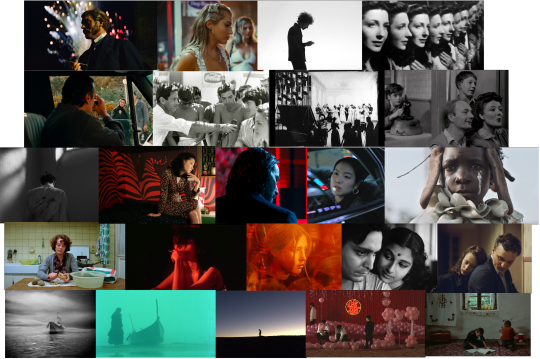
It's that time again. A few years ago I decided I would try and watch two films I'd never seen before each week. This year I've watched 374.
These are some of the ones that stood out.
JANUARY
The Leopard (dir. Luchino Visconti, 1963). Watched 1.1.23 at BFI Southbank
Benediction (dir. Terence Davies, 2021). Watched 11.1.23
Gangubai Kathiawadi (dir. Sanjay Leela Bhansali, 2022). Watched 17.1.23
The Swimmer (dir. Frank Perry, 1968). Watched 30.1.23.
Comizi d’amore (dir. Pier Paolo Pasolini, 1964). Watched 31.1.23
FEBRUARY
Ugetsu Monogatari (dir. Kenji Mizoguchi, 1953). Watched 7.2.23
Wings (dir. Larisa Shepitko, 1966). Watched 22.2.23
Mirror (dir. Andrei Tarkovsky, 1975). Watched 24.2.23
MARCH
Born in Flames (dir. Lizzie Borden, 1983). Watched 2.3.23
Yi Yi (dir. Edward Yang, 2000). Watched 5.3.23
Taste of Cherry (dir. Abbas Kiarostami, 1997). Watched 6.3.23
Jeanne Dielman, 23 quai du Commerce, 1080 Bruxelles. (dir. Chantal Akerman, 1975). Watched 11.2.23 at BFI Southbank
Judex (dir. Georges Franju, 1963). Watched 12.3.23
Transit (dir. Christian Petzold, 2018). Watched 14.3.23
A Man Escaped (dir. Robert Bresson, 1956). Watched 19.3.23
Bellissima (dir. Luchino Visconti, 1951). Watched 31.3.23
APRIL
Army of Shadows (dir. Jean-Pierre Melville, 1969). Watched 2.4.23
Jacquot de Nantes (dir. Agnès Varda, 1991). Watched 10.4.23
Where is the friend’s house? (dir. Abbas Kiarostami, 1987). Watched 13.4.23
John Wick: Chapter 4 (dir. Chad Stahelski, 2023). Watched 16.4.23 at BFI IMAX
Charulata (dir. Satyajit Ray, 1964). Watched 27.4.23
Night and Fog (dir. Alain Resnais, 1956). Watched 28.4.23
MAY
Thirst (dir. Park Chan-wook, 2009). Watched 3.5.23
Return to Seoul (dir. Davy Chou, 2023). Watched 7.5.23 at Curzon Hoxton
The Eight Mountains (dir. Felix van Groeningen, Charlotte Vandermeersch, 2023) Watched 12.5.23 at Curzon Hoxton
The Five Devils (dir. Léa Mysius, 2022). Watched 24.5.23
Nostalgia for the Light (dir. Patricio Guzmán, 2010). Watched 31.5.23
JUNE
Citadel (dir. John Smith, 2021). Watched 1.6.23
It’s Always Fair Weather (dir. Stanley Donen, Gene Kelly, 1955). Watched 10.6.23 at BFI Southbank 35mm.
Service for Ladies (dir. Alexander Korda, 1932). Watched 11.6.23 at BFI Southbank 35mm *nitrate*
And Life Goes On (dir. Abbas Kiarostami, 1992). Watched 14.6.23
Be Natural: The Untold Story of Alice Guy (dir. Pamela Green, 2018). Watched 19.6.23
King and Country (dir. Joseph Losey, 1964). Watched 20.6.23
JULY
London (dir. Patrick Keiller, 1994). Watched 3.7.23
Conquest of the Planet of the Apes (dir. J. Lee Thompson, 1972). Watched 14.7.23
Barbie (dir. Greta Gerwig, 2023). Watched 21.7.23 at BFI Southbank
Oppenheimer (dir. Christopher Nolan, 2023). Watched 23.7.23 at BFI IMAX. 70mm IMAX
I’m Not There (dir. Todd Haynes, 2007). Watched 28.7.23
AUGUST
Three Blind Mice (dir. William A. Seiter, 1938). Watched 17.8.23
Corridor of Mirrors (dir. Terence Young, 1948). Watched 22.8.23
World of Apu (dir. Satyajit Ray, 1959). Watched 26.8.23
L’argent (dir. Robert Bresson, 1983). Watched 31.8.23
SEPTEMBER
Past Lives (dir. Celine Song, 2023). Watched 3.9.23 at Curzon Soho.
Austenland (dir. Jerusha Hess, 2013). Watched 8.9.23
Lady Vengeance (dir. Park Chan-wook, 2005). Watched 19.9.23
News from Home (dir. Chantal Akerman, 1977). Watched 20.9.23
Edge of Tomorrow (dir. Doug Liman, 2014). Watched 28.9.23
OCTOBER
Killers of the Flower Moon (dir. Martin Scorsese, 2023). Watched 8.1.23 at Royal Festival Hall. London Film Festival
Judgement at Nuremberg (dir. Stanley Kramer, 1961). Watched 12.10.23
The Stranger and the Fog (dir. Bahram Beyzai, 1974). Watched 14.10.23 at BFI Southbank. London Film Festival. 35mm
I am Not a Witch (dir. Rungano Nyoni, 2017). Watched 26.10.23
Contraband (dir. Michael Powell, 1940). Watched 30.10.23 at BFI Southbank
NOVEMBER
Uncle Boonmee Who Can Recall His Past Lives (dir. Apichatpong Weerasethakul, 2010). Watched 9.11.23.
Anatomy of a Fall (dir. Justine Triet, 2023). Watched 15.11.23 at Curzon Hoxton
Citizens Band (dir. Jonathan Demme, 1977). Watched 21.11.23
DECEMBER
Oh, Rosalinda!! (dir. Michael Powell, Emeric Pressburger, 1955). Watched 2.12.23 at BFI Southbank. 35mm
How to Have Sex (dir. Molly Manning Walker, 2023). Watched 10.12.23 at the Garden cinema.
Tish (dir. Paul Sng, 2023). Watched 22.12.23
Fallen Angels (dir. Wong Kar-wai, 1996). Watched 29.12.23
----
Other highlights included: Stop Making Sense (twice!) on BFI IMAX. Tears of joy, dancing in my seat. Black Narcissus on nitrate at the BFI Southbank. Crying all the way through The Life and Death of Colonel Blimp at BFI Southbank. Showing someone L’Atalante and I Know Where I’m Going, two of my favourite films, in my favourite cinema (again, BFI Southbank). The terrible Fast X, in Vue Leicester Square with one of my best friends. Walking through Shoreditch on a Saturday night, maybe the most heterosexual place imaginable, to watch Bottoms at Curzon Aldgate. Talking and crying about Jonathan Demme at a house party with a stranger. Sitting and sobbing, breathless, after How to Have Sex - steeling myself and walking home thinking about my life, the lives of all the young women I know. Watching Aftersun for the second time at the beginning of the year with my youngest sister, floods of tears overtaking us both. Seven Samurai on the BFI IMAX with my best friends. The Hunger on 35mm at the Prince Charles Cinema, with more of my best friends. And screening Some Like it Hot on 16mm in the tiny theatre at the back of Ümit and Son in Clapton, surrounded by loving, beautiful people who make me who I am.
5 notes
·
View notes